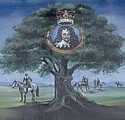This is a treasure trove of resources, including Charles’ own account (as told to Samuel Pepys), Anne Wyndham’s own account of the Trent Manor stay and the first account of the escape, written by Thomas Blunt, published in 1660. The contents of the book are as follows:
- Diary compiled by Thomas Blunt in 1827 from all available sources. A secondary source but of great value.
- Account by Lord Clarendon of the escape from his ‘History of the Rebellion, 1720. An early secondary source.
- A copy of a letter written by a prisoner at Chester about his involvement in the Battle of Worcester.
- The King’s own 33-page account, as dictated to Samuel Pepys. 1680. An invaluable resource, albeit produced some years after the event Not intended for publication, so, perhaps all the more valuable
- Boscobel – part 1 by Thomas Blount – an early and influential account of the first week of the escape. Published 1660, just after the Restoration.
- Boscobel – part 2 by Thomas Blount – he takes the story on to the eventual escape from Shoreham, though in less detail. Published 1681.
- Account by Thomas Whitgrave of Moseley Old Hall of his part in the escape.
- Letter from Captain Ellison to Lord Clarendon, dealing with his part on the events at Charmouth.
- Account of the Charles’s concealment at Trent Manor by Anne Wyndham. Very important and eloquent testimony.
There are also five tracts reproduced in the book by Alan Fey, Flight of the King. These two books together, provide accounts either or written or sourced from the following participants:
- Charles himself
- The Penderell family
- Thomas Whitgrave
- Captain Ellison
- Anne Wyndham
- Fr Huddleston
- Colonel Gunter
- Others who would have been interviewed by Thomas Blount
Taken together, these primary sources provide an outstanding resource, allowing us to have a great deal of knowledge of Charles’s time on the run. While there are some contradiction between different accounts, these are remarkably few and of no particular significance.

